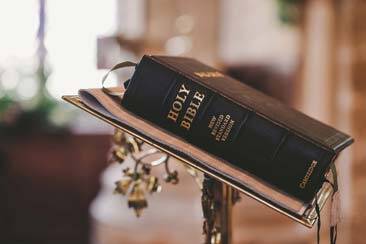Every year, households across North America receive free copies of a 150-year-old book, The Great Controversy. Millions more are shared around the world.
It’s written by Ellen G. White, a prolific author of the 19th and 20th centuries, and a co-founder of the Seventh-day Adventist Church. It looks at key parts of history through the lens of biblical prophecy, also offering insight for navigating our daily lives in an ever-changing world.
More than likely, the book was distributed as a free gift from various supporting ministries of the Seventh-day Adventist Church. This way, those who are interested in a spiritual perspective of the religious and political struggles of our world can study this information on their own time, at their own pace.
To learn more about this book and why it’s so significant to the Adventist denomination, we’ll give you an overview of its content:
- Context for current events
- How we can prepare for our lives ahead
- Explores the biblical concept of the “antichrist”
- The Reformation and the shaping of Protestantism
- Explores biblical concepts such as the sanctuary, life after death, and the Sabbath
- Insight about future events
- Encouraging personal Bible study
The Great Controversy can help us understand current events
 It’s natural to be curious about what’s going on in the world and how things got to where they are today. This book was written to help us understand the “whats” and “whys” behind the progression of our global history.
It’s natural to be curious about what’s going on in the world and how things got to where they are today. This book was written to help us understand the “whats” and “whys” behind the progression of our global history.
Many people, even those who don’t identify as religious, seem to feel that the world is headed for some sort of global event or paradigm shift.
Christians believe that event will be the second coming of Christ. Other religions also believe there will be a divine decisive move to triumph over evil. Others believe the world will eventually become so greedy and war-torn that civilization may nearly destroy itself, or at least deplete natural resources.
The Great Controversy was written using the Bible as its foundation for interpreting how history has unfolded. So many major events of the past lineup with specific predictions in biblical prophecy, and it can be fascinating to go through it all.
And even while studying our world’s messy history, The Great Controversy also upholds the hope that we can all have in Jesus Christ.
It reminds readers to be prepared for what’s coming

Photo by Sebastien Gabriel on Unsplash
Nothing quite compares to the helplessness one can feel when unprepared for a major event.
Students fear a pop quiz they’re not ready for.
Brides worry about having everything ready for their wedding day.
Moms-to-be want all ducks in a row before the baby is born.
Party hosts work tirelessly to ensure everything is set for when their guests arrive.
The Bible encourages us to be prepared for the second coming of Christ. The day of His return will be glorious for those who are expecting it. But it will look terrifying to those not expecting it.
The Great Controversy helps readers keep in mind that everything in this life leads up to the day when Jesus returns to make all things right again. We don’t have to feel unprepared or helpless, even while the world seems to crumble around us.
It explores the topic of the antichrist
The Bible’s book of Revelation remains one of the mysteries in Christianity. And within that book, there is much discussion over the power that is against Christ, referred to as the “antichrist.”
So who is the antichrist and how will we be able to identify this individual(s)?
If you’ve wondered about this, there’s another reason to consider reading this book.
By outlining the characteristics and exploring the clues Scripture gives about this power, The Great Controversy helps us deduce who the antichrist could be and how to stay faithful to God—even when much of the world becomes mystified with the antichrist.
It explores the Reformation and the shaping of Protestantism
Whether you’re an Adventist, Baptist, Catholic, Lutheran, or Methodist, the Reformation is a crucial part of the history of Christianity. Knowing what led to the Reformation and what was accomplished by the stance of reformers such as Martin Luther, Huldrych Zwingli, and John Calvin (and others) helps us understand how things became how they are today.
By reading this book, you get an in-depth look at this significant time in the world’s and Christianity’s history.
It covers biblical doctrines such as the sanctuary, death, and the Sabbath
When we were little, we needed someone to cut up our food into smaller bites. As adults, we do this for kids so they can eat safely and comfortably.
Certain concepts in the Bible also are better understood when broken down into parts, so we can “digest” them a bit easier.
The importance of the sanctuary, the Sabbath, what happens at death, and the Second Coming are a few teachings that can be a lot to mentally chew on. But it becomes easier the more we study—just as it is for any complex subject.
The Great Controversy helps break down these doctrines so we can see how they came together.
It tells what’s going to happen in the future
Yes, really.
One of the biggest questions of the human mind is, “what’s going to happen?”
Kids want to know what the cafeteria will be serving for lunch and young adults may want to know who they’ll marry. There’s always a point in our lives when we become increasingly curious about something in the future.
That curiosity also extends to spiritual matters. God knew we would be curious about the future, and He doesn’t want us to worry (Matthew 6:25-34) or to operate within a spirit of fear (2 Timothy 1:7).
While two-thirds of The Great Controversy relates to past events, the last third covers future events in correlation with words of prophecy in the Bible. God, in His infinite love for us, has given us a glimpse of what the future holds. This kind of information will encourage us to stay focused on Him when a difficult future falls on our planet.
It encourages further study of the Bible

Photo by Aaron Burden on Unsplash
1 John 4:1 says, “Beloved, do not believe every spirit, but test the spirits to see whether they are from God, for many false prophets have gone out into the world” (ESV).
When you read a book like The Great Controversy (or any book that claims to be inspired), the only way to know whether or not it’s credible is to compare it with the Bible yourself. This book encourages you to do just that.
“Go to God’s instruction and testimony! If they do not speak according to this word, there will be no dawn for them” (Isaiah 8:20, CSB).
If you decide to read The Great Controversy, know that you will be advised to go back to your ultimate guide, the Bible, to test what the book says. Any text other than the Bible that urges us to action should also encourage us toward further Bible study.
When society seems split over a matter and you seem caught in the middle, unsure of what to do…do the research yourself.
You don’t have to take anyone’s word for it that this book is either worth or not worth your time. The best way to be sure is to start with the first chapter and see for yourself.
By seeking God’s wisdom, He will lead you in the way you should go.
More Answers
What do Seventh-day Adventists Believe about the Remnant and its Mission?
The “remnant” are a group of faithful believers that have existed throughout history and proclaimed God’s truth, love, and plan to save humanity. They “remain” with God even amid persecution and also when it seems everyone else has rebelled against God or compromised their beliefs.
What do Seventh-day Adventists Believe about the Church?
Seventh-day Adventists believe that the idea of the church is an important biblical concept.
What Adventists Believe about The Experience of Salvation?
The Seventh-day Adventist Church believes that salvation is a gift that anyone can receive through faith in Jesus Christ, the Son of God. When we accept His sacrificial death in our place, He saves us from the penalty and power of sin (or evil), which prevents us from experiencing true freedom.
What do Seventh-day Adventists Believe about the Life, Death, and Resurrection of Jesus?
Jesus Christ, a person who lived in first-century Palestine, is the foundation of the Adventist faith. This is because it’s only through the life, death, and resurrection of Jesus that any of us have hope of life beyond the toil, suffering, and death of this world.
What do Seventh-day Adventists Believe about The Great Controversy?
The “Great Controversy” is the phrase Seventh-day Adventists typically use to describe the cosmic spiritual conflict between the forces of good (God) and the forces of evil or sin (Satan/the devil).
What do Seventh-day Adventists Believe about Creation?
Seventh-day Adventists believe that God is the creator of our world. They come to this conclusion from the first book of the Bible—Genesis. The account there tells us that God took six literal days to form the earth and all it contains, including us humans.
What Do Seventh-day Adventists Believe about the Father?
Like most Protestant Christians, Seventh-day Adventists believe in God the Father as part of the Godhead. We call Him Father because of His role towards Jesus. Jesus Himself encouraged us to also call Him Father.
What do Seventh-day Adventists Believe about Sin and the Nature of Humanity?
Seventh-day Adventists believe that humanity was created perfect and that, at our very core, we crave this kind of perfection and unity with God. But unfortunately, the Bible teaches that we chose to be wise in our own eyes and disobey God, which led to a natural tendency to be sinful, evil, and selfish.
What Do Seventh-Day Adventists Believe about God the Holy Spirit?
Besides believing in the full divinity of God the Father and God the Son, Adventists also believe in the full divinity of God the Holy Spirit. This post will go over what the Bible says about the Holy Spirit. You’ll learn:
What Do Seventh-day Adventists Believe about God the Son?
Seventh-day Adventists believe that Jesus is fully God, being one of the members of the Trinity. And that He plays a central role in it as the Son of God.
What Seventh-day Adventists Believe about the Trinity
How can Father, Son, and Holy Spirit all be one God? Find out as you learn what the Bible has to say about the Trinity.
What Seventh-day Adventists Believe about the Bible
The Bible forms the foundation for all that Seventh-day Adventists believe and teach. It reveals God to us and is our final authority on all issues relating to morals, doctrine, salvation, and the very nature and purpose of life itself (Isaiah 8:20).
How Important is a Weekly Sabbath as a Day of Rest?
Around the world, different religious groups have had a Sabbath—a day set apart for rest each week. A day to worship together, spend time with loved ones, and to just rest.
Why do Adventists Worship on Saturday?
Adventists worship on the seventh day of the week because God made Saturday a holy day at creation. Learn what makes this day so special to Adventists.
Didn’t find your answer? Ask us!
We understand your concern of having questions but not knowing who to ask—we’ve felt it ourselves. When you’re ready to learn more about Adventists, send us a question! We know a thing or two about Adventists.














